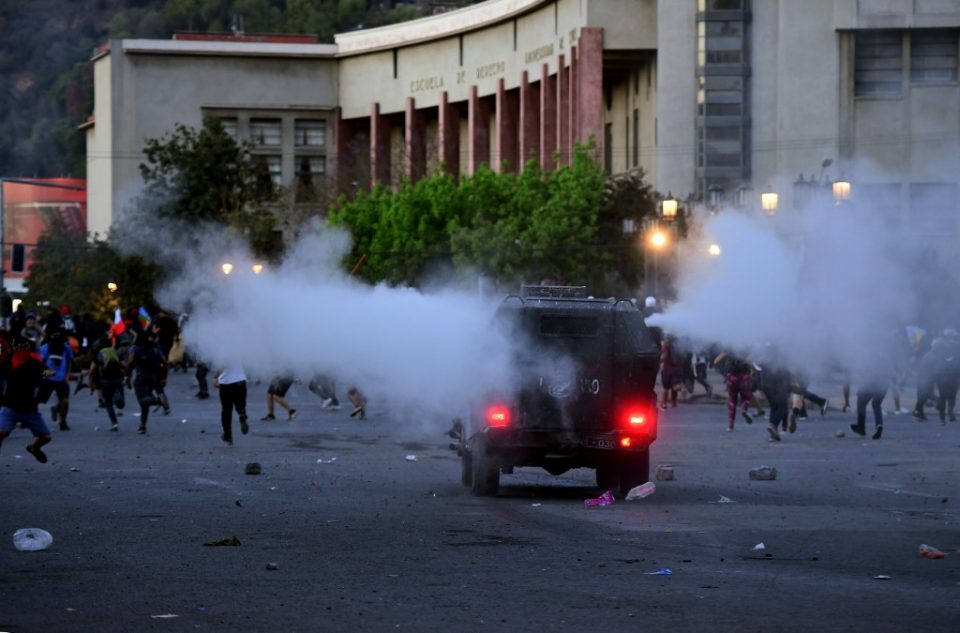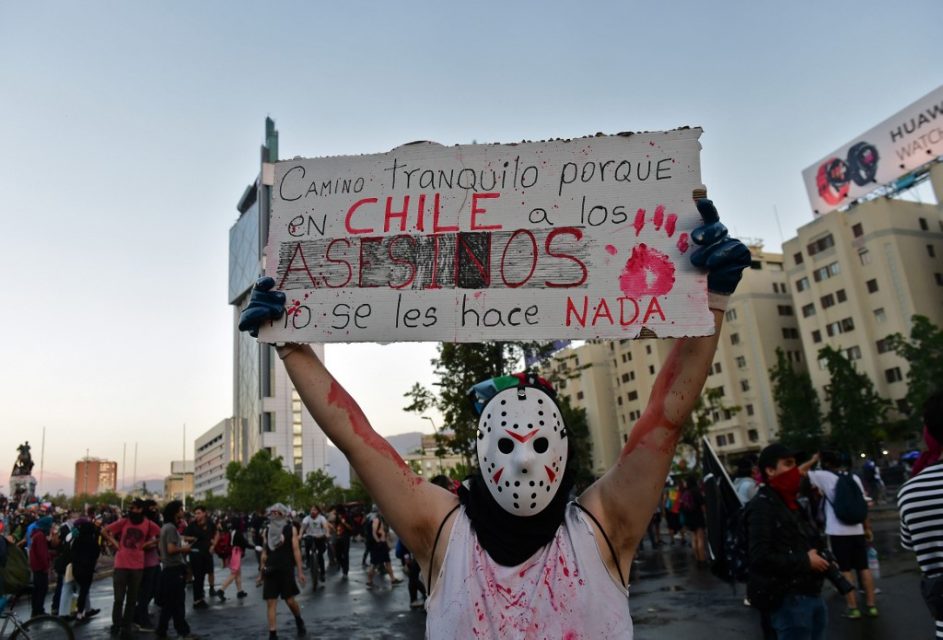
by Paulina ABRAMOVICH
Agence France Presse
SANTIAGO, Chile (AFP) — Chile’s government met with opposition leaders Thursday in a fresh bid to end deadly protests that forced the country to abandon hosting two major economic and climate summits, but leftist parties poured scorn on the efforts.
The unrest started with protests against a rise in transport tickets and other austerity measures and descended into vandalism, looting, and clashes between demonstrators and police.
Protesters are angry about low salaries and pensions, poor public healthcare and education, and a yawning gap between rich and poor.
Pinera has reshuffled his government and announced a series of measures aimed at placating protesters.
But they have continued demanding that the right-wing billionaire president step down.
Protests erupted again on Thursday as thousands of Chileans wearing Halloween masks and alien costumes swarmed the Plaza Italia — the epicenter of the demonstrations — in response to a leaked recording of First Lady Cecilia Morel complaining the situation in the country was like an alien invasion.
Hundreds of other protesters marched along Santiago’s main avenue to the presidential palace, where they clashed with police, who fired tear gas and water trucks.
Earlier on Thursday, following two hours of talks at the presidential palace, the government failed to convince political rivals it has the will to make the necessary changes to appease protesters.

Socialist Party leader Alvaro Elizalde said the government “is not prepared to listen to the citizens’ demands.”
Heraldo Munoz, leader of the Party for Democracy, said he’d still not seen “clear signals in favor of dialogue.”
Earlier, Elizalde and other opposition leaders expressed support for proposals to reform the country’s 1980 constitution, which dates to the dictatorship of Augusto Pinochet.
Pinera has not ruled out constitutional reform.
The speaker of the Supreme Court Lamberto Cisterna has backed a proposal to set up a parliamentary group as a first step towards a new constitution.
Reforms passed under the dictatorship loosened state regulation of education, healthcare and pensions — three key focuses of the current protests.
Washington, meanwhile, accused Russia of stoking the unrest through social media trolling.
The White House said US President Donald Trump had “denounced foreign efforts to undermine Chilean institutions, democracy or society,” in a phone call to Pinera.
A senior State Department official, speaking on condition of anonymity, pointed the finger at Russia, accusing it of seizing on debate in Chile, “and skewing it through the use and abuse of social media — trolling.”
– ‘Painful’ summit call –
The impact of the unrest on Chile’s international image worsened on Wednesday when the government said it was pulling out of hosting the APEC economic summit in November and the December COP climate gathering.
The country said it had no choice but to abandon the summits for security reasons.
Pinera said the move was “painful” but was driven by “common sense.”
Trump had said he was planning to meet Chinese counterpart President Xi Jinping at the APEC talks.
Trump was hoping for progress towards ending an 18-month trade war between the world’s two biggest economies.
The White House said on Thursday, however, that Trump backed Pinera’s decision to pull out of the summit.
“The United States stands with Chile, an important ally, as it works to peacefully restore national order,” said White House spokesman Judd Deere.
Trump said an alternative location for the signing of a US-China trade deal with Xi will be “announced soon.”
APEC said it supported Chile’s decision but gave no indication there would be a replacement summit this year, saying only that Malaysia would host the 2020 event.
Pinera said in an address on Thursday that Spain had offered to host the COP 25 climate summit in Madrid on the original scheduled dates of December 2-13.
– Alleged abuses –
Huge crowds took to the streets in the protests on Wednesday, shutting down numerous shops and businesses.
Twenty people have been confirmed killed in the unrest. Chilean prosecutors said Wednesday they were investigating a total of 23 deaths thought to be linked to the crisis.
Sixteen of the victims were killed “during the alleged commission of so-called ‘common’ crimes,” five “by actions of agents of the state” and two “under state custody,” prosecutors said on Twitter.
A mission led by the United Nations High Commissioner on Human Rights Michelle Bachelet — Chile’s former president — is expected to open a probe later this week into allegations of police brutality.
Amnesty International has expressed concern about claims of “sexual torture,” reports of eye injuries and situations in which police or military action directly led to a death.
© Agence France-Presse







